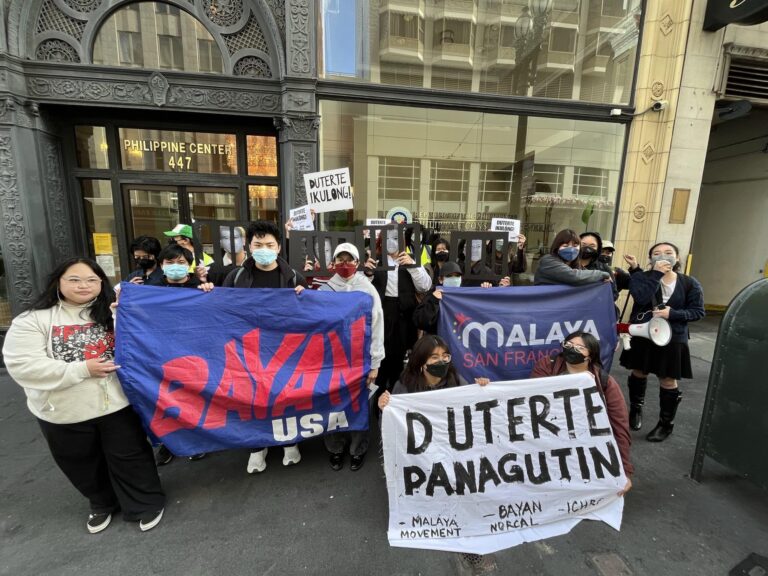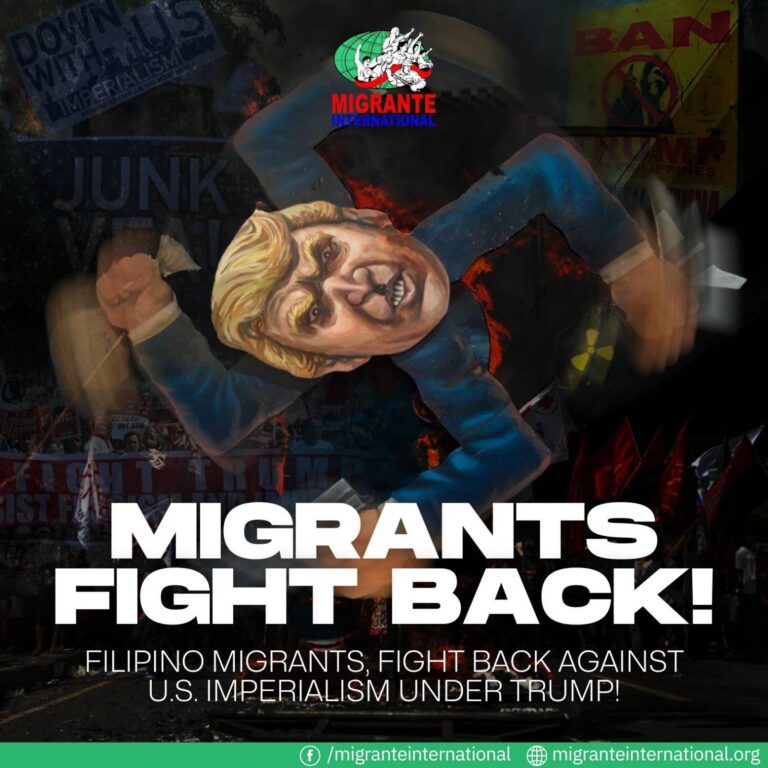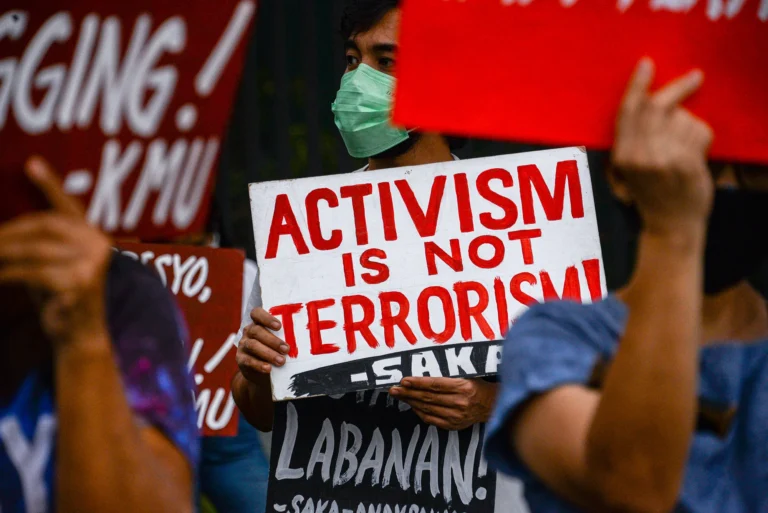Groups of overseas Filipinos launched a worldwide campaign in support of a family living wage for private and public sector workers in the Philippines at an online press conference led by Migrante International on Wednesday.
Filipino migrants from the USA, Canada, Europe, the Middle East, and the Asia-Pacific expressed their support for a significant minimum wage hike on the basis of rising costs of basic goods and to address the growing number of Filipinos looking for work abroad rather than in their home country. The groups support calls of local workers for a Php 1,200 daily minimum wage in the private sector and a Php 33,000 monthly salary for public sector employees.
Migrante International echoed sentiments that basic goods costs are too high to be sustained by local workers’ wages and OFW remittances alike.
“Hindi sumasapat ang kasalukuyang sahod na kinikita ng ating mga manggagawang Pilipino para mabuhay ng disente ang kanilang pamilya,” said Josie Pingkihan, Deputy Secretary General of Migrante International.
Militant trade union center Kilusang Mayo Uno is among the groups leading the call for Php 1,200 a family living wage for workers.
“Ang manggagawa ay baon sa utang, malnourished at hindi nakakapag-aral ang aming anak dahil napakababa ang aming sahod…sinalubong pa tayo ng pagtaas ng presyo ng kuryente, tubig, SSS, at krudo,” said Jerome Adonis, Kilusang Mayo Uno Secretary General and Makabayan senatoriable. “Hindi hugot sa hangin ang Php 1,200 family living wage. Iyan ang kinakailangan para mabuhay ang isang pamilyang Pilipino sa harap ng pagtaas ng mga presyo ng bilihin.”
At the press conference, groups of overseas Filipinos released their manifesto of unity for a family living wage in the Philippines. Over 156 organizations of OFWs and overseas Filipinos from five global regions signed the manifesto as of the press conference.
“Our families should not have to constantly rely on the remittances born from our working two, to three, or even more jobs under exploitative and dangerous conditions. And as workers in our host countries, we will continue to stand in solidarity with our fellow workers in their just calls for a living wage,” stated migrant groups in their manifesto.
The manifesto concluded by calling on President Marcos Jr. to address low wages, working conditions, landlessness, and harassment and attacks faced by poor workers and farmers all over the country.
End the basis of human trafficking abroad by raising wages in the Philippines
Among the organizations who raised support for a Philippine minimum wage hike is the Hong Kong-based Filipino Migrant Workers Union. The migrants union asserts that a family living wage in the Philippines will help families through current economic hardships.
“Gagaan din para sa amin kung tataas ang ang sahod ng aming mga kaanak at pamilya. Magiging katuwang namin sana sila at hindi na lamang sa aming remittances nakaasa,” said Sherry Siganay, Secretary General of the Filipino Migrant Workers Union.
OFWs in the Middle East, still enraged in the wake of the killing of Dafne Nacalaban, called for a Philippine wage hike as a lasting solution to the worsening cases of abuse of overseas Filipinos.
“Mula noong 2007 pa, marami kaming mga migranteng manggagawa dito na nakakatanggap lang ng maliit na pasahod. Hindi ito makakatustos sa pang-araw-araw na bilihin,” said Ryan Morales of Migrante UAE. “Hindi tumataas ang sahod dito…kaya mahigpit kaming nakikiisa sa mga manggagawang Pilipino para itaas ang sahod sa Pilipinas.”
Filipinos in Europe also stressed the need for a family living wage in the Philippines to combat worsening OFW abuses in Eastern Europe that followed large-scale recruitment of Filipinos into the continent.
“Nakakaloko si Mr. Marcos noong sinabi niyang may malaking labor market na naghihintay sa Europa para sa mga Pilipino. Walang pakundangan niyang ibenenta ang lakas-paggawa ng ating mga kababayan,” said June Mark Yañez of the Filipino Ecumenical Diaspora in Europe. “Mabilis ang pag-recruit ng mga manggagawang Pilipino patungo sa Eastern Europe. Kasabay ng pagtaas na ito ay ang mga kaso ng pag-abuso, paglabag sa kontrata, at pananamantala sa mga migranteng Pilipino.”
Canada-based overseas Filipinos claim that the local economic crisis in the Philippines breeds an environment for the rampant human trafficking of Filipino workers.
“Sinasamantala ng mga labour trafficker at illegal recruiter ang mga kahinaang ito sa ekonomiya sa pamamagitan ng pagbibigay ng mga mapanlinlang na pangako ng disenteng trabaho, na kadalasang humahantong sa mapagsamantalang kondisyon sa paggawa o trafficking,” said Chris Sorio of Migrante Canada.
“Ang isang Family living wage ay makakabawas sa pinansiyal na desperasyon na nagtutulak sa mga manggagawa na tumanggap ng mga mapagsamantalang kontrata at magtiis sa mapang alipin na kalagayan sa paggawaan,” continued Sorio.
Amid threats of mass deportation under the second Trump government, Migrante USA called for wage hikes and jobs at home to support thousands of vulnerable and undocumented Filipinos.
“Mayroong halos 387,000 hanggang 1 milyong undocumented Pilipino sa US. Karamihan ay naging bulnerable sa abuso at pagsasamantala ng kanilang amo,” said Lester Ramos, human trafficking survivor and member of Migrante USA. “Kaya narinig ko ang pahayag [ng Ambassador ng Pilipinas sa US na si] Jose Romualdez na ang mga walang papeles ay dapat mag-self-deport nang hindi nag-aalok ng tulong o mga garantisadong trabaho kapag bumalik sila sa Pilipinas, nadismaya talaga ako.”
“Walang sinuman sa atin ang dapat makaranas ng ganoong kahirapan kabilang ang pamumuhay sa takot na maging undocumented kung mayroon tayong living wages sa Pilipinas para suportahan ang ating mga pamilya,” continued Ramos.
Migrante International concluded the press conference by calling on overseas Filipinos to support the upcoming nationwide protests against poverty, corruption, and a lack of accountability in the Philippine government on January 31 to begin realizing migrants’ calls to raise wages and lower the costs of basic goods in the Philippines.##
https://www.abs-cbn.com/news/nation/2025/1/29/-family-living-wage-pushed-to-address-rising-cost-of-basic-goods-ofw-deployment-1926?utm_source=dlvr.it&utm_medium=facebook&fbclid=IwY2xjawIHLIJleHRuA2FlbQIxMQABHQV0-aHYS306gW1Aui9zCdhAKNnhQd_cFGqHeBBqPWCousMBvfzp3qqxIQ_aem_fFM84E01A71RrHgHH-Erog







